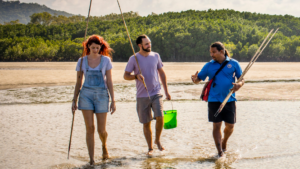In the lush depths of the Daintree Rainforest in Far North Queensland, the Kuku Yalanji people uphold a rich cultural heritage and culinary tradition. For centuries, they have thrived on a varied selection of bush tucker — indigenous foods harvested from their ancestral lands. This age-old custom not only sustains their physical well-being but also reflects an inherent bond with their land and its natural resources.
Harvesting Bush Tucker
Central to Kuku Yalanji culinary practices is the art of gathering bush tucker. This involves a deep knowledge of seasonal patterns, plant identification, and sustainable harvesting techniques passed down through generations. The rainforest provides an abundance of edible treasures: fruits, nuts, roots, and leaves that serve both nutritional and medicinal purposes.
- Fruits and Berries: Among the most prized fruits are the Davidson plum, known for its tangy flavour and high antioxidant content, and the native quandong, a versatile fruit used in sauces, jams, and desserts. The rainforest also offers bush bananas, which are smaller and denser than their tropical cousins, and the sweet, purple mangosteen, celebrated for its delicate taste.
- Nuts and Seeds: Nuts play a crucial role in the Kuku Yalanji diet, providing essential fats and proteins. The rainforest produces the macadamia nut, cherished for its rich, buttery flavour, and the bunya nut, traditionally roasted and consumed during ceremonial gatherings. These nuts not only sustain but also symbolise abundance and communal sharing.
- Roots and Tubers: Root vegetables such as yams and taro are staples in Kuku Yalanji cuisine, offering sustenance and versatility. Traditionally dug from the forest floor, these tubers are roasted or cooked in earth ovens to enhance their natural flavours. Their preparation often involves elaborate rituals that honour the spirit of the plants and the land.
- Game and Seafood: Beyond plant-based foods, the Kuku Yalanji also harvest game and seafood. Monitor lizards, known as goanna, are hunted for their meat, which is lean and flavourful when cooked over open fires. In coastal areas, shellfish and fish such as barramundi are caught using traditional methods, ensuring a sustainable harvest from the rivers and seas.
Culinary Techniques and Traditions
Cooking methods are equally immersed in tradition. The Kuku Yalanji utilise fire pits and hot stones for roasting meats and vegetables, imparting a distinctive smokey essence to their dishes. Leaves from rainforest plants, such as bananas or palms, are used to wrap food parcels, infusing them with aromatic flavours during cooking.
Cultural Significance
For the Kuku Yalanji, bush tucker is more than just food; it’s a symbol of their cultural identity and a spiritual link to the land. The act of gathering food is a shared experience, strengthening the bonds between generations and instilling a sense of responsibility for their ancestral lands. The elders play a crucial role in passing down their culinary knowledge to the younger members, ensuring the preservation of their rich heritage in the face of modern challenges.

Immerse Yourself in the Culture of the Kuku Yalanji
Discover the essence of Kuku Yalanji culture with our full-day tours, Daintree Dreaming – Aboriginal Art & Culture and Daintree Dreaming – Traditional Aboriginal Fishing, departing from Cairns and Cairns beaches. These immersive experiences offer a unique insight into the traditional practices of the Kuku Yalanji people.
Visiting the Daintree Rainforest and immersing yourself in the culture of the Kuku Yalanji is a profound journey into Australia’s Indigenous heritage. As guardians of this ancient land, the Kuku Yalanji provide a unique perspective on sustainable living, cultural strength, and the deep bond between humanity and the natural environment.
